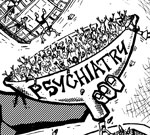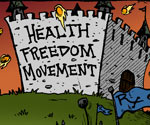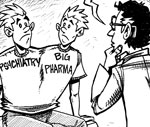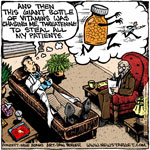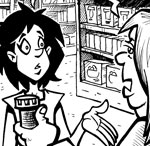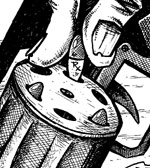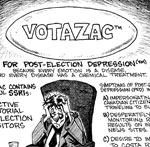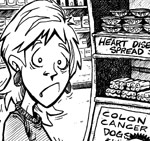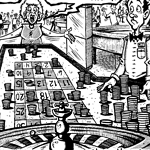How to Lower Cholesterol - Lower Your Cholesterol Naturally
| Share on Facebook | Share on Twitter | Share on Google+ |
The statistics says it all: 40% of deaths in the US result from heart disease, and over 60 million of our population today have suffered (or still suffer) from cardiovascular disease. With these numbers, you should have the idea of how alarming and how high the risk of heart disease is, both for the old and the young.
Remember that there is a way for you to avoid heart disease. The best way to do this is to keep yourself informed of what causes heart disease, assess if you are at risk of this disease, and if you are, what you should do if you are a potential candidate.
Cholesterol and Cardiovascular Health
We often hear people warning us about cholesterol and telling us that the best way to keep a healthy heart is to keep the cholesterol level low.
What is cholesterol anyway? Cholesterol is a waxy, fat-like substance that is made in the liver and is found in foods such as meat, eggs and dairy products.
Cholesterol Misconceptions
There are two common misconceptions that you need to correct when you talk about cholesterol:
First, is the assumption that the amount of cholesterol in your bloodstream is directly linked to your diet. It is true that your diet can affect your cholesterol levels but this effect is somewhat minimal since more than 80% of blood cholesterol is produced by the liver.
Second, I would like to emphasize the fact that cholesterol is not necessarily bad for your health.
There are two forms of cholesterol, one is called the low density cholesterol (LDL) - the bad cholesterol and the other is called the high density cholesterol (HDL) - the good cholesterol.
HDLs are actually needed by the body for various purposes such as for hormone production, and for making cell walls and nerve sheaths.
The Truth About LDL
LDLs however, are labeled as the bad guys as they are theorized to attach to your arterial wall thereby creating accumulated blockage that can lead to a heart attack or stroke.
But the truth is, LDL is also vital for the body to function as it should.
Some studies show that LDL becomes actually bad when it becomes oxidized. When your LDL level is not as it should be and becomes problematic, this goes to show that there is some imbalance that you need to respond to. Doing so by trying to lower cholesterol will only be palliative, and will not counter the underlying cause of this imbalance.
The Importance of HDL/Total Cholesterol Ratio
The main key here is to keep your LDLs low and your HDLs high. Much too often, instead of this cholesterol ratio, we interpret cholesterol numbers in terms of total cholesterol, and this line of thinking can really be misleading.
You should also note that cholesterol levels that are pushed too low can weaken your immune system significantly. You might not suffer from heart disease, but you will most likely end up with an infectious one that is just as detrimental.
Cholesterol is NOT the Only Marker for Heart Health
Another misconception that I would like to stress is the assumption that keeping your cholesterol levels safe will assure you of a healthy heart.
Health practitioners have always focused too much on cholesterol and most often prescribe statin drugs for lowering cholesterol to cure heart problems. What they fail to consider is that majority of those who experience heart attacks have normal levels of cholesterol.
Other factors such as triglycerides, homocysteine and C-reactive proteins, are usually ignored all together. The most important way to check whether you are at risk of heart disease is to get a blood test and to check the levels of all these four factors. Let me go through them one by one.
Triglycerides
Excess levels of triglyceride will cause your blood to thicken, which can lead to clotting and artery blockage that can lead to heart failure. If you have high triglyceride and a high cholesterol levels, your heart will literally explode anytime.
Homocysteine
Research studies have revealed that over 10% of deaths due to heart failures and most deaths due to stroke are caused by excessive levels of homocysteine. These victims had healthy cholesterol levels and lipid readings.
Homocysteine is a protein that results from methionine (an amino acid) metabolism and has been seen to have a significant role in development of cardiovascular problems.
Homocysteine usually gets cleared out of our systems but in some people, it unfortunately does not. Thus, your homocysteine level is a marker for determining whether you are at risk of heart disease.
C-Reactive Protein
Though this study is relatively new, C-Reactive Proteins in your body is indicative of inflammation in your blood. High blood inflammation levels is a sure fire predictor of potential heart problems and risk of stroke.
What About Statin Drugs?
Statin drugs are the most widely used medical prescription for controlling heart problems. Many of you who are reading this might actually be taking them presently.
Consequently, cholesterol drugs, most especially statin, is a multi-billion dollar industry. But considering its mainstream use, why are there still millions of deaths caused by heart attacks? I leave that up to you to think about.
Statin drugs have the ability to reduce your body's production of cholesterol by blocking the enzyme HMG-CoA reductase in the liver from producing them. Blockage of this enzyme will definitely interfere with your body's natural cholesterol metabolism, destroy liver cells and ruin many other normal bodily functions.
It may also tend to force your cholesterol to decrease to a low level, much too low that it can become potentially dangerous.
Because of this mechanism, statin drugs have serious dangerous side effects which include liver problems and muscle pains. Other reported side effects include memory loss, sexual dysfunction, irritability and personality changes.
An Unexpected Side Effect
What is worse is that statin drugs also deplete your body's supply of CoQ10, an essential antioxidant for cardiovascular health, so that they ironically increase your risk for heart disease. As a matter of fact, one statin drug marketed as Baycol has been removed from market circulation due to its fatal side effects.
Diet For Lowering Cholesterol?
If your cholesterol level is out of line, doctors, friends and relatives would usually advise you to go for low cholesterol diets and statin drugs. They would tell you to avoid foods high in cholesterol.
I have already presented the potential ill effects of statin drugs, so now let me present the dangers in having cholesterol levels that are too low. Studies have shown that total cholesterol levels below 190 for males and 178 in females can enhance the risk of strokes and cerebral hemorrhage. Lower cholesterol levels have also been related to depression, mood changes, hormonal and sexual dysfunction and weakened immune system.
Studies have discovered that low fat, employing low cholesterol diets to lower cholesterol naturally is dangerous because it mostly lowers HDL and have very minimal impact on LDL. Thus, low fat diets can only add to the cholesterol ratio imbalance and make everything worse.
Eating the Right Kind of Food is Always Good
Do not get it wrong though, you can keep a healthy heart, and maintain normal levels of cholesterol, triglycerides, and homocysteine by eating the right kinds of food.
Triglycerides, more importantly, are highly influenced by diet. High triglyceride levels are caused by refined, process carbohydrates.
You should not blame natural animal fats entirely, but always avoid transfats and hydrogenated oils, as well as too much sugars, processed and refined foods and sodas.
Technically speaking, a diet like this should not be labeled as the best cholesterol lowering diet, but the best diet to keep your heart healthy.
How to Lower Cholesterol Naturally
So what then are the natural options for reducing cholesterol? Is there really a natural cure for high cholesterol and triglycerides? Fortunately, yes. There is a variety of natural cholesterol lowering nutrients which include:
- Policosanol - extract from sugar cane and rice bran wax
- Phytosterols - from plants, inhibits absorption of cholesterol in the intestines
- Theaflavins - found in tea, helps in lowering blood pressure
- Oryzanol rice bran oil - reduces triglycerides and cholesterol
- D-Limonene oil - from orange peel, helps dissolve cholesterol
- Pumpkin seed oil - good source of fatty acids, zinc, caroteinoids and selenium
- Lecithin oil - emulsifies cholesterol in your arteries
- Vitamin E oil - natural anti-oxidant
Are they Really Effective?
Yes! There are now numerous clinical data that proves the efficacy and safety of these nutrients for reducing LDL to a healthy level and normalizing triglyceride levels, without harming HDL.
Practical Advice For a Healthy Heart:
As you can see, there are a lot more about heart health that we do not know about.
There are many misconceptions that you need to let go of in order to know the actual truth behind it.
The answer to the predominating question of how to lower cholesterol is not as simple.
It involves you to rethink and re-orient yourself in terms of misconceptions about heart diseases in general.
But we do hope that this article has shed some light into what can really keep your heart as healthy as possible.
Choosing a Quality Cholesterol Supplement
For further exploration, I recommend the free e-book "Heart Attack / Stroke Prevention" as a guide on heart health for more in depth knowledge on cardiovascular health. I believe that the only way to avoid heart diseases is to arm yourself with the RIGHT kind of knowledge.
Also if you are looking for an effective natural alternative to lower cholesterol, Lipi-Rite (formerly Cholest-Natural) is one of the best natural products that you can find in the market. The truth is that there is no one formula that fits everyone's cardiovascular needs, but this product combines almost all of the 100% natural ingredients that I mentioned previously.
Lipi-Rite this cholesterol formulation has been researched and formulated by a world-renowned bio-scientist.
I have personally seen how it helped people to balance their cholesterol ratio, so I highly recommend this product to you and to anyone aiming for a healthier and happier heart and life.
-
Skin CareMen Skin Care
-
Free ResourcesFree eBooks
-
The way you think, the way you behave, the way you eat, can influence your life by 30 to 50 years.Deepak Chopra
-
Featured Cholesterol SupplementLipi-Rite
- Researched by one of the world's top bio-scientists
- Contains all-natural ingredients
- Includes synergistic ingredients..
- Is supported by multiple clinical studies.
-

